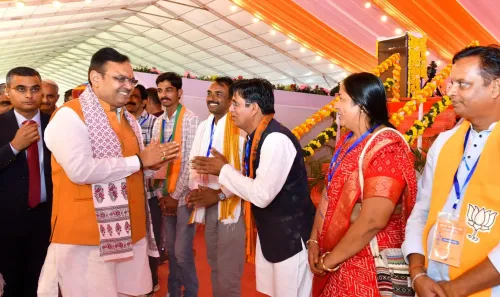Did Maharashtra Minister Celebrate NDA's Victory in Bihar as Modi's Development Triumph?

Synopsis
Key Takeaways
- NDA's victory is linked to PM Modi's development focus.
- Bihar's voters signal a rejection of past governance issues.
- The campaign was inclusive, targeting broad developmental agendas.
- Youth participation played a crucial role in the election outcome.
- Opposition's response indicates a struggle to adapt to changing voter expectations.
Mumbai, Nov 15 (NationPress) In a significant show of support for the National Democratic Alliance's (NDA) overwhelming success in the recent Bihar Assembly elections, various leaders have begun to express their views. Maharashtra's Minister of State for Social Justice and Shiv Sena leader Yogesh Kadam praised the election results as a remarkable achievement, directly linking them to Prime Minister Narendra Modi's commitment to development.
Kadam's comments emerge as the NDA's success is dissected regarding PM Modi's personal appeal and development initiatives, which encompass infrastructure enhancements, youth employment schemes, and women-focused programs such as increased reservations and financial support.
In an exclusive interview with IANS, Kadam highlighted how the voters of Bihar have turned their backs on years of perceived mismanagement, indicating a national trend toward progress and development under PM Modi's leadership. "The accomplishments of Bihar's electorate in these elections represent a milestone in their own right," Kadam stated.
"Nationwide, we observe a vigorous campaign focused on development under PM Modi's guidance." He noted that the public's substantial mandate reflects a long-standing dissatisfaction with the 25-30 years of governance under Lalu Prasad Yadav's family, which he claims resulted in widespread neglect and emigration from the state.
"Previously, the absence of developmental efforts in Bihar compelled people to seek better prospects elsewhere," Kadam elaborated. "Now, a vast state like Bihar is advancing rapidly. The populace has fully embraced PM Modi's vision, and the electoral results demonstrate that commitment."
Kadam, recognized for his candid views on national issues, dismissed the idea that the NDA's success was solely due to women's votes or particular policies. "It would be misleading to attribute our victory solely to women's support," he insisted.
"Women participated in large numbers, but so did men and young voters. India is globally acknowledged as a youthful nation, and Bihar's younger demographic turned out significantly, prioritizing development above all else," Yogesh Kadam remarked.
He asserted that the NDA's campaign was comprehensive, targeting large-scale developmental themes rather than depending on any specific community, demographic, or policy. This holistic strategy, Kadam contended, resulted in the alliance's decisive victory, setting the stage for Chief Minister Nitish Kumar's fifth term.
Focusing on the opposition, particularly the Mahagathbandhan led by Tejashwi Yadav's Rashtriya Janata Dal (RJD), which secured only 25 seats, Kadam accused them of engaging in desperate strategies. He criticized their focus on the Special Intensive Review (SIR) topic—commonly seen as a subtle reference to Bihar—as a calculated excuse for their failure.
"The opposition foresaw their defeat, so they constructed narratives to shift blame afterward," Kadam commented. "They were essentially laying the groundwork for their own decline. By criticizing the Election Commission and disparaging initiatives aimed at empowering women, they have only highlighted their desperation. The electorate has issued a strong rebuke, and in doing so, the opposition is undermining its own credibility and integrity."
Beyond the electoral dynamics, Kadam applauded the Modi administration's approach to national security challenges, drawing parallels to the decisive leadership that facilitated Bihar's turnaround. He acknowledged India's intelligence agencies as among the world's top-tier, praising their proactive measures against external threats.
"Under Prime Minister Narendra Modi's assertive guidance, the government is tackling these issues with unwavering determination," Kadam remarked. "Pakistan's attempts to instill fear in India are in vain; we have no reason to be alarmed. The citizens of India trust Prime Minister Modi and Home Minister Amit Shah to protect the nation's interests."
Kadam's perspective, as a Maharashtra leader commenting on Bihar, highlights the NDA's nationwide resonance, bridging regional gaps. His statements serve as a rallying cry for sustained progress. "This is not merely a win for Bihar; it is India's validation of advancement over traditional politics," he concluded.









